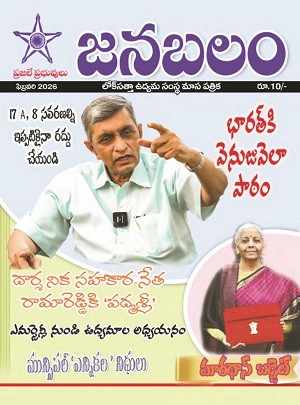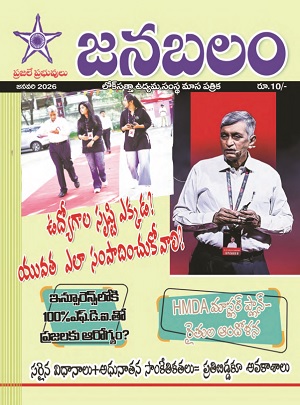A few years ago, farmers in Andhra Pradesh declared a crop holiday. Farming became non-viable not only due to crop failures or natural calamities, but also, more tragically, due to market manipulations and non-remunerative prices. Even when there was a bumper crop, farmers were not able to break even. These forced them to go in for crop holiday, which shocked the society which rued the tragedy that befell the farmers.
Today, when Loksatta declared an ‘Election Holiday,’ friends and well-wishers are expressing the same sort of anguish, and many questions are raised in right earnest about the sagacity of this step. Loksatta believes in letter and spirit that while the party is above individuals, country’s interests are far more important than that of a party. Hence, in the present circumstances, this decision is inevitable.
When dynastic succession, cronyism and nepotism are ruling the roost in the arena of Indian politics, Loksatta introduced a new political culture focusing on people’s involvement and empowerment. The Loksatta Movement which started in 1996-97 ushered in a new political lingo, which is embraced willy-nilly even by the traditional mainstream parties, albeit for sloganeering purpose, if not for real change for betterment.
It may not be out of place to recall how the Loksatta Movement started with a seemingly innocuous step to end malpractices at petrol stations. This simple project saved the nation an estimated three lakh crores of rupees till date on the one hand, and, on the other, it made the consumers more aware of the potential power of participatory democratic action.
The core philosophy underlying the vision of Loksatta, be it as a movement or a full-fledged political party, is absolutely the same. Loksatta and its founder Dr Jayaprakash Narayan had to work against many odds to build a viable organisational framework for the party without a sizeable cadre at the grass-roots level. When it came to fighting elections, it became impossible to fight against the brute power of money, muscle, liquor and freebie-based culture of the mainstream political parties. Loksatta could not get the expected 15-20% of the vote share.
A question is posed by many whether this is a valid reason to declare an Election Holiday. Several opine that organisational lacunae should be rectified to get the desired results. Even if Loksatta were to build a wonderfully strong organisational framework, ground reality is not conducive to bring in the much desired change in the political ethos for some time to come.
Loksatta took a strong and well-thought out decision to distance itself from elections and work with like-minded people to achieve its cherished goals. The most immediate agenda of Loksatta 2.0 is: Decentralisation of power and devolution of funds to States and local bodies, taking care, at the same time, to keep national unity and integrity and the responsibilities of the Central government, intact; and reforms in education and health sectors on an urgent footing.
From Delhi to galli, there is no issue concerning the well-being of the people of India that is not addressed in-depth by Loksatta. Working simultaneously on all these aspects, Loksatta has decided to focus its immediate attention on education, health and devolution of power to States and local bodies. At the cost of sounding repetitious, it may be stated that even if Loksatta were to continue to fight in the arena of electoral process, the winds are not favourable.
Though there are good people in all the mainstream political parties who want to put a stop to the rotten system of spending crores and crores in elections, they remain isolated and helpless. Loksatta can never compromise its core values either for personal aggrandisement or for short-term power.
Loksatta’s definition of ‘real politic’ is to put in place a system in which every child gets an equal opportunity to develop its potential full well, without facing any discrimination because of caste, gender, region, language, poverty and so on. This is the first and foremost goal of Loksatta and hence the decision to declare an Election Holiday.
Loksatta’s motto ‘Antidote to bad politics is good politics and not no-politics’ is being accepted by more and more people, especially the youth. To some extent at least, it could kindle a hope in many hearts that politics can be a sacred vocation. It elevated the standards of public debate quite considerably.
It seeks the blessings of people for its decision to declare an Election Holiday and work for with a greater urgency to achieve decentralisation and devolution of power, and to reform health and education sectors, which will lead to empowerment of the most vulnerable sections of our society.
Courtesy: The Hans India By Srinivas Kusampudi
Wednesday, April 27, 2016
Subscribe to:
Post Comments (Atom)





No comments:
Post a Comment